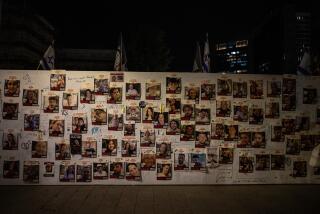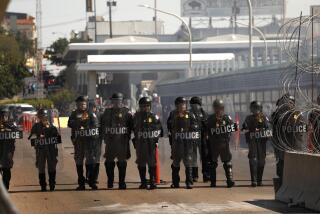Call a Terrorist a Terrorist
The Bush administration has been trying to build the broadest possible coalition in the new war on terrorism, and that effort makes good sense, up to a point. But there are worrisome signs that this coalition may be getting built on the strength of a dangerous word game that we should not tolerate.
At issue is what defines âterrorism.â Getting countries to denounce terrorism is not much harder than getting them to denounce evil, as long as the meaning of terrorism is left to the eye of the beholder. It should not be.
There should be one nonnegotiable price of admission to the anti-terror coalition: that all members accept a straightforward definition of terrorism. Although there can be endless debate about the precise meaning of the word, the basic concept is clear enough.
To borrow from a definition set forth in U.S. law: âThe term terrorism means premeditated, politically motivated violence perpetrated against noncombatant targets.â What this means is that blowing up Jews in Jerusalem pizza parlors or Tel Aviv discotheques is terrorism just as much as blowing up the World Trade Center. And that gunning down Muslim worshipers in cold blood, as the Israeli extremist Baruch Goldstein did in Hebron in 1994, is terrorism as well.
The Bush administration has been flirting with the idea of including the likes of Iran and Syria in the anti-terror coalition. Indeed, the anti-terrorism executive order that the president issued on Sept. 24 leaves the door open to their participation by declining to name organizations such as Hezbollah and Islamic Jihad, which these countries have supported.
It is worth exploring the possibility, however slim, that the leaders of Iran, Syria or the Palestinian Authority may be willing to end their open or tacit support for terror. But our eagerness to build a coalition must not lead us to wink at a continuing refusal on their part to accept a basic understanding of what terrorism is.
In the view of too many who give lip service to opposing terrorism, suicide bombings in New York or Washington are acts of terror while suicide bombings in Israel are acts of legitimate--indeed noble--resistance. For them, the end justifies the means.
And that is precisely wrong. Unless you are prepared to abjure the means of terror--irrespective of how just or even holy you believe your cause to be--you should not be welcome in Americaâs coalition.
What about the notion that the enemy of our enemy is our friend, no matter how bloody his hands? Should we care about a clear articulation of right and wrong?
We should. Those who give support to suicide bombers and salute the families of these âmartyrsâ should not be entitled to wear a badge of honor. As President Bush has said, this is a time for clarity, for standing up and declaring forthrightly which side you are on--not for allowing people to speak out of two sides of their mouths.
This is not to say that worrying about the issue of Islamic hearts and minds is unimportant. It is vitally important. One of the profound challenges we face as we embark on this new shadow war is to combine military power and covert cunning with a fully engaged effort--through enhanced economic and foreign assistance and a rejuvenated public diplomacy--to project a truer image of the U.S. than prevails today in much of the Islamic world. In the last âtwilight struggleâ this nation fought against the Soviet Union and won, the soft tools of democracy were seen as a critical complement to the hardware of weapons and troops.
They will be at least as important in our new struggle. Provoking a true clash of civilizations between Islam and the West is doubtless a key strategic objective for Osama bin Laden and his allies, and it is crucial that we avoid it. Yet the way to avoid it is not through linguistic appeasement.
We cannot gloss over the bedrock issue of what we are fighting. We are fighting against the murder of innocents, pure and simple. Let those who endorse that principle join us.
More to Read
Sign up for Essential California
The most important California stories and recommendations in your inbox every morning.
You may occasionally receive promotional content from the Los Angeles Times.










